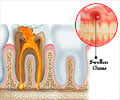Dental decay seems to be a most disturbing part of the healthcare crisis poorer Americans are confronted with.
Former US President Bill Clinton dubbed his country’s healthcare system immoral. He was of course referring to skyrocketing healthcare costs.
It turns out dental care scene is extremely worrying. Last Spring Katrina vanden Heuvel, editor of The Nation, talked about a dental epidemic after the death of 12-year-old Deamonte Driver of Maryland when his untreated tooth infection spread to his brain.Last month, The New York Times painted a horrifying picture of the state of dental care, where bootleggers sell dentures that would otherwise be unaffordable to many people missing teeth.
Untreated cavities are a leading cause of kids missing school, people use Krazy Glue to reattach broken teeth, or swish rubbing alcohol to treat an infection, "burning the gums and creating ulcers."
Dentists don’t care to be part of the Medicaid insurance as reimbursement rates are low. Currently, Medicaid only covers pulling teeth to treat infections -- not root canals or dentures.
It indeed looks like an epidemic. According to Maryland Senator Ben Cardin's staff, dental decay is now the most common chronic childhood disease in the US, affecting twenty percent of children aged 2 to 4, fifty percent of those aged 6 to 8, and nearly sixty percent of fifteen year olds. It is five times more common than asthma among school age children, and nearly 40 percent of African-American children have untreated tooth decay in their adult teeth.
Improper hygiene can increase a child's adult risk of having low birth-weight babies, developing heart disease, or suffering a stroke. Eighty percent of all dental problems are found in just 25 percent of children, primarily those from lower-income families.
In March, in response to Driver's death, Cardin cosponsored the Children's Dental Health Improvement Act of 2007 along with Senator Jeff Bingaman, who had pushed similar legislation for seven years. The bill called for $40 million annually for five years to help community health centers hire dentists to serve poor children. It also would have awarded $50 million in grants to help states improve dental services to children enrolled in Medicaid or the State Children's Health Insurance Program (SCHIP).
Advertisement
The dental bill was folded into the CHIP bill. The final version of CHIP -- passed by Congress and vetoed by President Bush -- didn't contain the grants sought by Cardin and Bingaman but it did guarantee dental coverage to kids and also established minimum standards of care.
Improving reimbursement rates and the availability of dentists is necessary in order for poor kids to avoid long waiting lists and get the timely services needed, activists note.
One dentist, for example, told the Washington Post that an abscess "is like a time bomb, ticking." The newspaper said that less than one-third of nearly 500,000 Maryland children on Medicaid saw a dentist last year, "a statistic that is typical of the problem nationwide."
But things are looking a little better in the state now. After Driver's death, Maryland Department of Health & Mental Hygiene Secretary John M. Colmers created a Dental Action Committee to make concrete recommendations on what could be done to increase access of dental care providers for lower-income people. One of the key recommendations was a $44 million grant to raise Medicaid reimbursement rates equal to the median charges in the Atlantic region.
"We're not going to solve these problems overnight," Colmers told Katrina vanden Heuvel me. "This is a substantial down-payment towards reaching our goals."
Although there has been much talk about healthcare reform in the presidential campaign, there has been little mention of dental care. The Obama and Edwards campaigns declined to comment.
Ann Lewis, Senior Advisor at Hillary Clinton for President, pointed to a recent speech Senator Clinton delivered in Iowa where she made her commitment to dental coverage clear -- and it happened to touch on Deamonte Driver's death: "I want to cover dental care. And in the congressional plan, which I open up to everybody ... there are more than 250 plan choices. Most of them cover dental care. One of the things we are finding out is all of the connections between dental problems and heart disease, between dental problems and other systemic conditions. So, if we don't cover dental care, you're going to miss a lot of the problems that will then get very expensive….”
Is there some hope in it? One has to wait and see.
Source-Medindia
GPL/S











